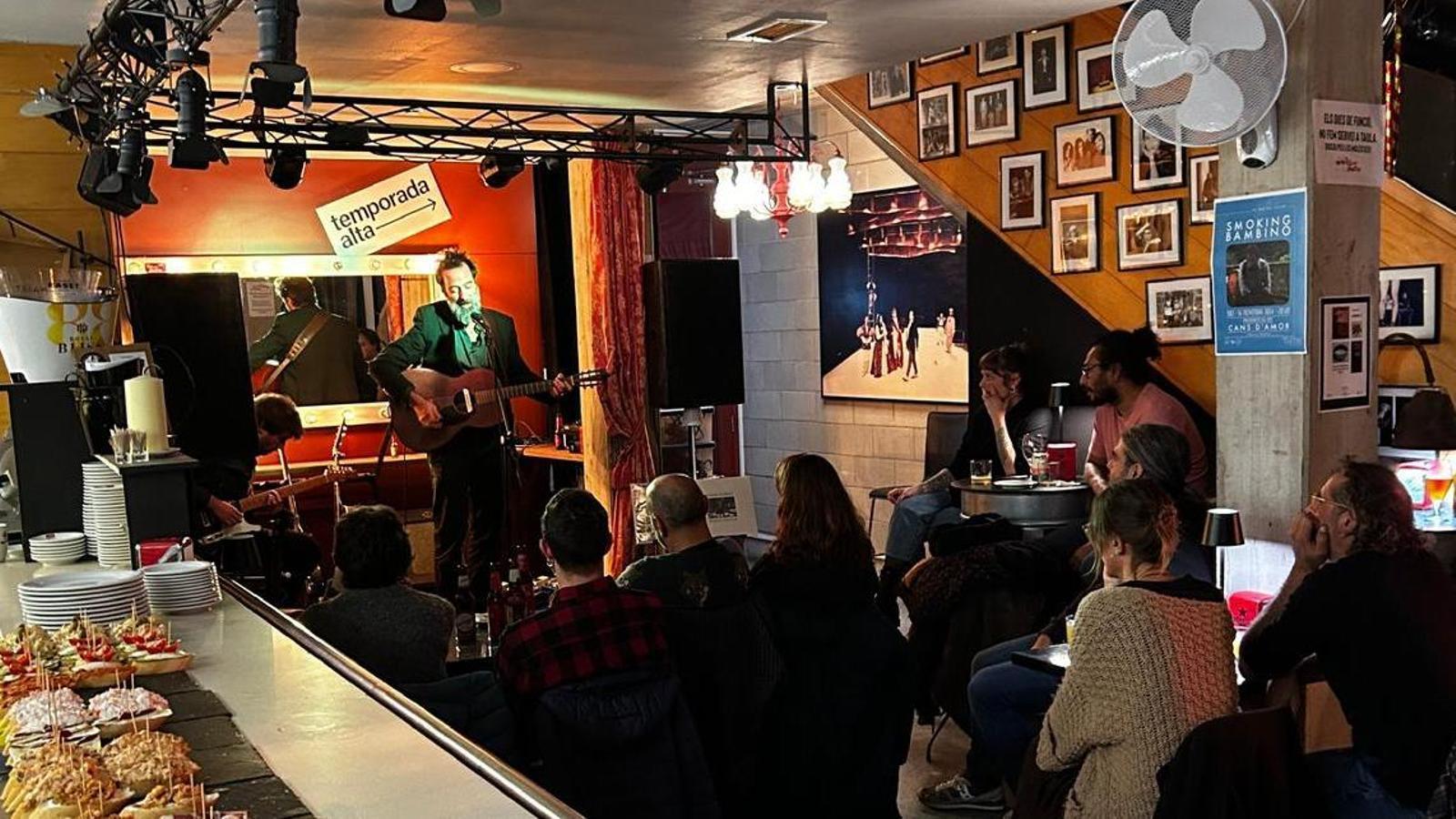The small theater bar that has revitalized Salt Lake City's popular culture
The Salt Theatre Bar organizes a regular program of cultural activities, with monologues by comedians such as Manel Vidal and Oye Sherman as the main attraction.


LeapThere are bars that are much more than just an establishment serving drinks and food. This is the case of the Salt Theater Bar, which, in recent years, has become a true social attraction where, alongside the theater's regular programming, all kinds of cultural and popular events are organized. In the backyard during the summer months, or in the small interior room decorated with tables and chairs in a cabaret-style setting, stand-up comedy nights, concerts, DJs, book presentations, and exhibitions are scheduled every week, often to sold-out audiences. All of this has revitalized a Salta space steeped in history and has consolidated a local audience that had been missing something like this. It's no longer just the bar. where people have a drink on performance days, but over time it has established itself as a place with a life of its own, complementing and enriching the cultural drinks at the Teatre de Salt. Throughout this month of September, before the whirlwind of Peak seasonThe bar has even created its own festival, the Random, with about twenty activities.
Pere Calderón, who took over management of the establishment three and a half years ago, leads all this hustle and bustle. He serves, cooks, takes orders, keeps accounts, and manages the entire lineup of performances. After a few difficult first months, marked by pandemic restrictions, Calderón finally managed to take ownership of the project and things started to work. He has carte blanche from Bitò, the performing arts company that manages the theater—and also the bar—through a municipal concession, with a pact not to counterprogram each other and not to make noise while the performance was in progress. "The first year, only the audience for the plays came, and things didn't go any further, so I decorated it, soundproofed it, and started a bit of a regular program to be able to build our own audience," Calderón explains. Initially, he began getting involved in popular events like rice dishes, calçotadas, and other events. Then came the first concerts, stand-up comedy shows, and book presentations: "We've opened this space in the town, since before, in some way, the word "bar" was a thing. from the theater He was in charge, and there were people from the neighborhood who didn't come because they didn't go to the theater, but now they have come back," he says.
First-class stand-up comedy, tapas, and food from other restaurants
The monthly stand-up comedy event is one of the most popular activities. Some of the top names on the Barcelona scene have graced the small stage of this Salta bar: "Barcelona comics have a WhatsApp group and talk about what happened at Salt," reveals Calderón. Artists such as Oye Sherman, Irene Minovas, Ester Bertran, Xavi Dora, and Albert Roig have also appeared. Also featured is Salta comedian Manel Vidal, who was surprised by the turnout: "The names we're bringing are amazing, but they're not just for Manel; Manel also signed up after being amazed and seeing what we've done," adds the ideologue.
Now, within the framework of the Ràndom Festival, in addition to a new night of stand-up comedy, the bar has prepared a painting exhibition by Salta actor Jordi Vilches, a conversation between Íngrid Guardiola and poet Gabriel Ventura, and a concert by Borrissol, Dan Peralbo's guitarist. Also popular activities such as a rice contest or a board game tournament Secret Code.
Gastronomically, this establishment's offering is also unusual: Calderón serves the bar and usually serves Basque-style pinchos, prepared by himself in a very small kitchen. But also, true to the cooperative spirit of the establishment, he sometimes offers food prepared by neighboring restaurants, such as pizzas from Can Pep or group menus from El Petit Racó, in a truly exceptional collaboration within the hospitality industry.
The legacy of Can Panxut
Despite not being its official name, regular customers and spectators refer to the bar as Can Panxut. This was the name of the Salta Athenaeum located in this same space, where all kinds of activities were organized in the 1970s and 1980s. Previously, it had been the Parish Trust, which was also also very successful, and during the Athenaeum's era, it hosted rallies, festivals, performances, film screenings, talks, and conferences. Many organizations emerged from this space, such as Pere Botero's Diablos (The Devils) and the Talleret de Salt, a theater company that made a name for itself on the Catalan scene. Thanks to the drive of this group of young actors and playwrights, the space reopened in 1997 as the current Teatro de Salt.
A founding part of Bitò came from the Talleret, which, since then, has managed the theatre, always faithful to this legacy: "Without the Talleret, this theatre would probably not have been built, because, at that time, the Generalitat required that to have a new theatre you had to be the capital of a region or have a certain number of inhabitants, have a certain number of inhabitants of Bitò and one of the founding members of the Talleret. And, regarding the push that the bar has recently gained, he adds: "Since 1997, it's really the first time that we've found someone who has been able to get more out of it. Pedro is under no obligation to do all the other activities he does, but he helps us and mutually nourishes the theatre's programming, and allows us to reach new audiences."
Calderón came to the Bar del Teatre after a long career linked to both the hospitality and cultural worlds. He had worked on scenography, video, and design projects, making music videos with Lax'n'Busto, Feliu Ventura, and Obrint Pas. He had also been a professor at the University of Girona and recently prepared the set design for the successful show The mothers, by Fel Faixedas and Carles XurigueraHe hasn't completely abandoned this side of his career, but now he's 100% focused on the project at hand: "I work at the bar I'd like to go to and in the neighborhood I'd like to live in," he concludes.
